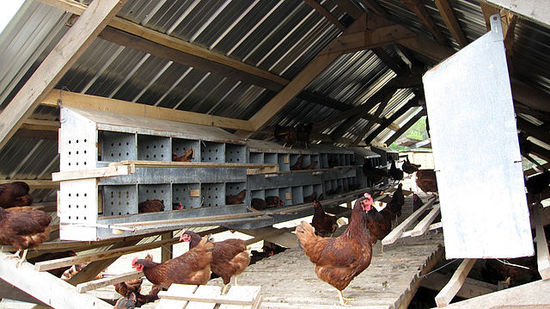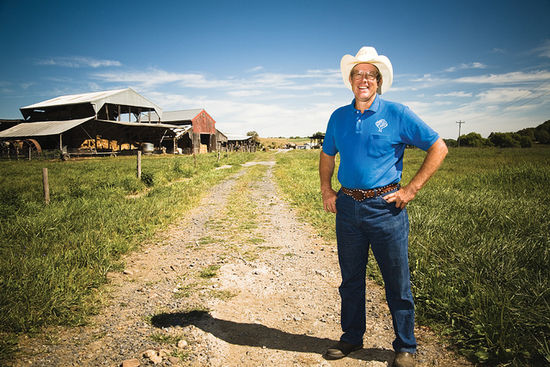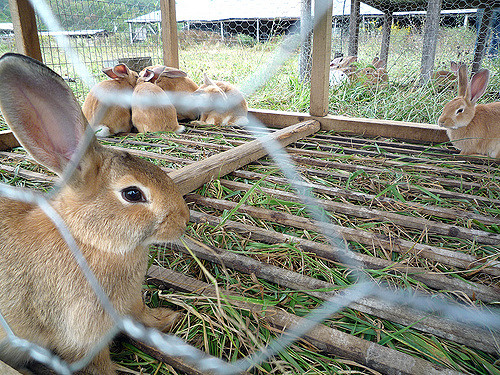Polyface Farms: Difference between revisions
Jump to navigation
Jump to search

No edit summary |
(+ category) |
||
| (3 intermediate revisions by 2 users not shown) | |||
| Line 1: | Line 1: | ||
{{Breadcrumb|Food and Agriculture|Animal Husbandry}} | {{Breadcrumb|Food and Agriculture|Animal Husbandry}} | ||
[ | [[File:JoelSalatinPolyfaceFarms.jpg|thumb|right|550px|Joel Salatin of Polyface Farms]] | ||
The | [[File:EggmobilePolyface.jpg|thumb|right|550px|The [http://www.polyfacefarms.com/2011/07/25/pastured-eggs/ Eggmobile] at Polyface Farms in Virginia.]] | ||
[http://www.polyfacefarms.com Polyface Farms], led by Joel Salatin, is a permaculture farm that leads the way in sustainable production of meat. They endorse transparency and the sharing of knowledge of good farming practices, so that others can replicate their success. | |||
Pastured broiler chickens serve as the farm's centerpiece enterprise, but other animals are also raised, including laying chickens, cows, pigs, turkeys and rabbits. | |||
==Methods== | |||
*Synergistic poly-cultures with seasonal production and rhythms (as opposed to single focused farms or CAFOs). | |||
*Growing pastures with a healthy, lively soil continuously built up with organic matter (as opposed to tillage-centric farming, which wears down soil with time). | |||
*Capitalizing on animals' unique traits and activities (for example, chickens rotate behind cows, sanitizing bugs and helping spread cow manure). | |||
*Rotating animals using low-tech portable pens, or high tech electric fencing. | |||
*Focus on value adding enterprises and assets with high return per time and capital investment (as opposed to high-capital, low-return machinery like fancy new trucks and buildings) | |||
*Focus on function over form. | |||
==More Information== | |||
*Salatin has written many books, such as "You Can Farm", that go into more detail on his farming methods. | |||
*The farm has an apprenticeship system for sharing practices with paid interns. | |||
*The farm is generally open to any visitors. | |||
*http://www.polyfacefarms.com | |||
*[http://www.youtube.com/watch?v=TQPN1O03z8I#t=10m47s Discussion of Polyface Farms in a TED talk] | *[http://www.youtube.com/watch?v=TQPN1O03z8I#t=10m47s Discussion of Polyface Farms in a TED talk] | ||
[[File:Rabbits Polyface.jpg|thumb|left|550px|''"This may be the only commercial flock of rabbits in the United States that has been line-bred for chemical-free production."'' - Joel Salatin, Polyface.]] | |||
[[Category:Food and Agriculture]] | |||
Latest revision as of 00:08, 3 September 2016
Main > Food and Agriculture > Animal Husbandry

The Eggmobile at Polyface Farms in Virginia.
Polyface Farms, led by Joel Salatin, is a permaculture farm that leads the way in sustainable production of meat. They endorse transparency and the sharing of knowledge of good farming practices, so that others can replicate their success.
Pastured broiler chickens serve as the farm's centerpiece enterprise, but other animals are also raised, including laying chickens, cows, pigs, turkeys and rabbits.
Methods
- Synergistic poly-cultures with seasonal production and rhythms (as opposed to single focused farms or CAFOs).
- Growing pastures with a healthy, lively soil continuously built up with organic matter (as opposed to tillage-centric farming, which wears down soil with time).
- Capitalizing on animals' unique traits and activities (for example, chickens rotate behind cows, sanitizing bugs and helping spread cow manure).
- Rotating animals using low-tech portable pens, or high tech electric fencing.
- Focus on value adding enterprises and assets with high return per time and capital investment (as opposed to high-capital, low-return machinery like fancy new trucks and buildings)
- Focus on function over form.
More Information
- Salatin has written many books, such as "You Can Farm", that go into more detail on his farming methods.
- The farm has an apprenticeship system for sharing practices with paid interns.
- The farm is generally open to any visitors.
- http://www.polyfacefarms.com
- Discussion of Polyface Farms in a TED talk

